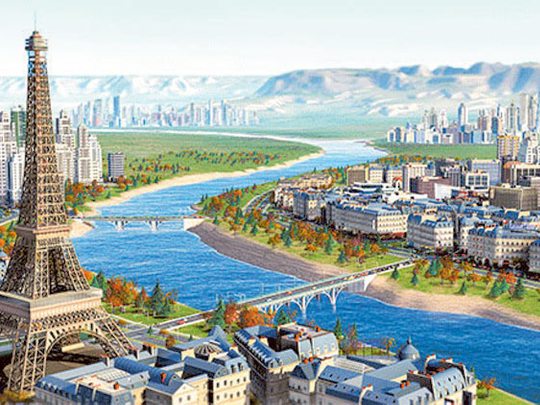
When do publishers decide that sequels can no longer support suffixes? Is there a formula somewhere that can identify when a number is too high to whack on the end of a title, where it suggests doddering venerability rather than cutting-edge innovation? Does it decide when to scrape all the numbers and subheads off the end of an IP and start over with the original name? Does it have a flowchart section that works out when profit from nostalgia will overcome numerical confusion, and ends in a big red box with “REBOOT” written in the middle?
Anyway, the people behind SimCity have made that decision. This isn’t SimCity 6 or SimCity: Infographics Edition, it’s just SimCity. But it’s the new one, obviously.
Ecosystem
The exciting thing about SimCity if you’re not into data representation, which is beautiful in this game as it happens is the scope of the multiplayer. Plugged into EA’s Origin network, the game supports asynchronous play from up to 16 mayors in a region at any one time, and they’re encouraged to work alongside each other to construct Great Works things such as arcologies or international airports.
Each potential city has strengths and weaknesses focused around their natural resources; so while an oil-rich city might rake in money and resources hand over fist, environmental difficulties might not make it a very nice place to live and shop.
Tourist towns can provide excellent services to visiting Sims, but a lack of material goods means that they can find themselves unable to stand on their own. In region-based play, even in single-player, each city can cover the weaknesses of others and gain aid where it needs it most.
But players are encouraged, not required, to work together. As each region forms a layered ecosystem, bad choices on the part of one player can hamper their neighbours. In one multiplayer session at EA’s Guildford HQ, the criminals from my scummy Gambletown would frequent daytrips to the neighbouring Lovely City to the North, where they would rob shops and shoot people in the face until arrested.
Trolling
Lovely City, by the way, was a glittering metropolis built around great concentric circles, with happy citizens and bulging coffers. Their downtown buildings were so tall that they could be seen from the docks at Gambletown, if you cleared a hole through the smog and could draw line of sight past the neon billboards advertising our scuzzy gambling halls. Occasionally Lovely City would send one of their many ambulances to heal injured Gambletownians, which presumably they were charging me for.
Gambletown’s main export being crime was accidental, although my decision to go light on the police force and heavy on the casino-based fun was a conscious one. When you start actively working against other players, the fun really gets going.
You can compete to see who can flood each other’s cities fastest with airborne pollution from industrial areas. You can intentionally not build police stations and put the seediest parts of your city on main roads so your criminals are encouraged to rob high-value buildings in neighbouring cities. You can build fancy boutiques and steal shopping revenue from their citizens. You can, if you’d like, order far too many service vehicles and send them all to other cities to “help” them out, severely clogging up their traffic flow.
Effectively, you can carry out a DDoS attack with binmen. What’s not to like about that?
Origin
The online element extends into every facet of the game, most notably and contentiously an always-on DRM required even in single-player mode. As the Beta test went live this week many users reported long wait times and difficulties logging onto the much-maligned Origin service. One over-zealous mod banned a user for a letter of complaint against the DRM written six months ago. Players will need to stay connected at all times, and while occasional drops in connection are allowed, anything longer than three minutes could result in a loss of data.
It’s not all bad, though. EA is doing some fairly clever things with the system, and having the entirety of your community online and feeding data can produce some interesting results. Global prices for resources such as coal and oil are generated and updated from the push and pull of supply and demand. Leaderboards show off which players are the “best” at SimCity.
Frequent events give players challenges to complete and submit to EA in exchange for limited-edition achievement badges linked to their profiles we took part in the Soak the Rich challenge, we were tasked with extracting as much money as possible from high-value Sims in taxes. Even though it’s a small addition, a game as complex and multilayered as SimCity can benefit from arbitrary restrictions and goals when it comes to encouraging long-term play.
For all that, though, and all my talk of trolling each other or working together to build an airport, communication in-game lacks something. Even while sitting next to the mayor of Lovely City and jealously staring at his palatial residences, I couldn’t think of a way for us to work together towards a goal. Perhaps effective communication is a development that will come with time and mastery of the game; but at present it feels like there’s little framework for discussion.
Layers
Much like previous SimCity games, there’s no way to “win”, the same way there’s no way to “win” an ant colony or a gro-bag sprouting tomato plants, and instead there’s a wide variety of ways to lose. A city balances on a knife-edge and can fall into filth, corruption, crime, fire and homelessness at the hands of a negligent mayor.
SimCity is still a game of not losing, then, rather than a game of winning. The difficulty curve starts off shallow zone some houses, zone some places for the people in the houses to work, zone some places for the people to spend money earned while working, try not to let things catch on fire too much but increases as layers of complexity are added to the simulation. More so than ever, and especially considering the multiple cities available in each region, it’s the dizzying interplay of stuff that makes for a satisfying experience.
Charm
At one point during the development of Gambletown, there was a problem with poo. Too much of it, backing up in people’s houses, and making them a) ill and b) covered in poo. As town mayor, I was expected to solve the problem. The current infrastructure of Gambletown was ill-suited to deal with the poo demands from the residential district, so I built a sewage outlet on the edge of town and connected it to a special road for poo.
I turned up the speed of the game to make sure everything was working correctly and the poo began to sort itself out, to flow out of the city in ordered streams, represented in the sewage map by brownish circles shifting under the roads of my city in the sewers. Everything was right again, and the grim heartbeat of my city calmed me. Everything was in order. Everything was clean and tidy again, for a while.
I was happy, absurdly happy, to watch poo shuffle out of a city down a special road that I built. If a game can do that, it deserves some kind of praise.












